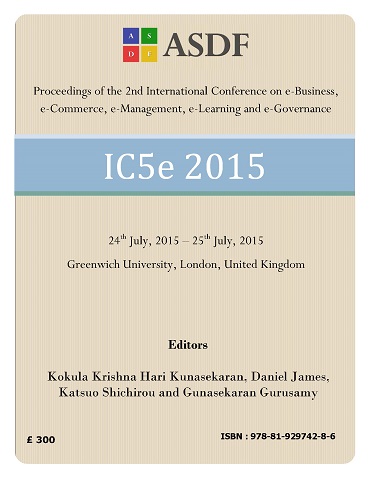- Publication Meta:Value
- Short Title:IC5e 2015
- Publisher:ASDF, India
- ISBN 13:978-81-929742-8-6
- ISBN 10:81-929742-8-6
- Language:English
- Type:Hard Bound - Printed Book
- Copyrights:IC5e Organizers / DCRC, London, UK
- Editor-in-Chief:Kokula Krishna Hari K
- Conference Dates:24 - 25, July 2015
- Venue Country:London, United Kingdom
- Submitted Papers:417
- Acceptance Rate:4.31%
- Website:www.ic5e.org
Welcome to ASDF Electronic Digital Library!
IC5e 2015
IC5e 2015
International Conference on eBusiness, eCommerce, eManagement, eLearning and eGovernance 2015
Paper 003
The Differences between Online Banking Users and Non-users
Abdullatif Alhudaithy1
1King Kalid University, Saudi Arabia
Abstract
This study examines factors influencing intentions towards internet banking (IB) among bank clients in Saudi Arabia. Specifically, it examines the differences between IB users and non-users in their characteristics and in the factors that influence their intention to start or continue using IB. Design, Methodology, Approach; Questionnaires based on the Decomposed theory of Planned Behaviour (Taylor and Todd, 1995) were administered online to existing IB users (N= 651) and in person to non-users (n=408), all clients of Riyad bank in (Riyath), Saudi Arabia. Findings; Perceived Relative Advantage and Compatibility, Ease of Use, Self-efficacy, Resource Facilitating Conditions and Perceived Website Characteristics are significant in predicting users’ intention to continue using IB, but not in non-users’ intention to start; for non-users, only Perceived Trust and Subjective Norms are significant. Practical Implications; Banks’ strategies to encourage adoption of IB should include two dimensions, Non-users should be targeted by emphasising safety, security and social acceptance; users by enhancing the features important to them, with website design of key importance. Originality and value; the research refines and extends the original DTPB model with the addition of a new construct, Website Features. It confirms and clarifies the distinction between technology users and non-users suggested in previous research. It also provides insights from a novel context, Saudi Arabia, contributing to cross cultural understanding of technology adoption.
Keywords
Author's Profile
Author profile can be generated and linked through our partners World Book of Researchers. To include your profile online Click Here. After it is approved, please email to edlib @ asdf.res.in to create a link with all the papers.
e-AID
IC5e.2015.003
Cite this Article as Follows
Abdullatif Alhudaithy. "The Differences between Online Banking Users and Non-users."ÂInternational Conference on eBusiness, eCommerce, eManagement, eLearning and eGovernance (2015): 26-38. Print.
© 2010 - by EDLIB .
All Rights Reserved.

